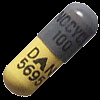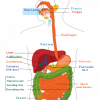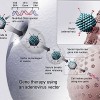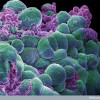A new superdrug that fights pneumonia, pimples AND schizophrenia? Meet Minocycline.
A cheap drug called Minocycline, which is normally prescribed for pneumonia and acne will be tested in a new trial to reduce the symptoms of psychosis in patients suffering from schizophrenia.
Schizophrenia is a mental disorder characterized by a breakdown of thought processes and by poor emotional responsiveness. According to the WHO the disorder affects around 0.3–0.7% of people at some point in their life, or 24 million people worldwide as of 2011. There is no general cure and the pharmacologic treatment of schizophrenia leaves much to be desired.
Now the National Institute for Health Research in the U.K. is funding a large research trial on Minocycline beginning this April.
Scientists believe schizophrenia and other mental illnesses including depression and Alzheimer’s disease may result from inflammatory processes in the brain. Minocycline, which is a broad-spectrum tetracycline antibiotic, has anti-inflammatory and neuroprotective effects, which could account for the recent positive findings.
The new hope comes after case reports from Japan in which the drug was prescribed to a young male patient with schizophrenia. The young man had no previous psychiatric history but became agitated and suffered auditory hallucinations, anxiety and insomnia. Blood tests and brain scans showed nothing unusual and he was started on the powerful anti-psychotic drug Halperidol. The treatment had no effect and he was still suffering from psychotic symptoms a week later when he developed severe pneumonia and was prescribed the antibiotic Minocycline to treat the infection. This treatment surprisingly led to dramatic improvements in his psychotic symptoms. When the pneumonia cleared and Minocycline treatment was stopped, the schizophrenia symptoms reappeared.
This serendipitous observation prompted researchers to test Minocycline in patients with schizophrenia around the world. Trials have already been held in Israel, Pakistan and Brazil, with schizophrenic patients showing significant improvement.
Minocy cline might be a safe and effective solution to bring symptoms of schizophrenia under control. But more work on how antibiotics alter the inflammation status of the brain remains to be done, as well as trying to find a permanent treatment. Using antibiotics in this way presents a problem. Antibiotics are compounds that are literally ´against life,´ aimed against microbial pathogens. The treatment of infectious diseases by antibiotics is compromised by the development of antibiotic resistance of microbial pathogens. There is a direct correlation over time between antibiotic use and the increase in antibiotic-resistant bacteria. Researchers therefore need to address this issue but the signs are good: Minocycline has been on the market for a while, is broadly described, and resistance seems to have been avoided thus far.
cline might be a safe and effective solution to bring symptoms of schizophrenia under control. But more work on how antibiotics alter the inflammation status of the brain remains to be done, as well as trying to find a permanent treatment. Using antibiotics in this way presents a problem. Antibiotics are compounds that are literally ´against life,´ aimed against microbial pathogens. The treatment of infectious diseases by antibiotics is compromised by the development of antibiotic resistance of microbial pathogens. There is a direct correlation over time between antibiotic use and the increase in antibiotic-resistant bacteria. Researchers therefore need to address this issue but the signs are good: Minocycline has been on the market for a while, is broadly described, and resistance seems to have been avoided thus far.
Further reading:
Background information, video links and animations about schizophrenia can be found at the DNA Learning Center’s G2C Online webpage.
Van Os J, Kapur S. Schizophrenia. Lancet. 2009;374(9690):635–45. doi:10.1016/S0140-6736(09)60995-8. PMID 19700006
| Print article | This entry was posted by Christine Marizzi on March 26, 2012 at 4:41 pm, and is filed under G2C Online. Follow any responses to this post through RSS 2.0. You can leave a response or trackback from your own site. |








